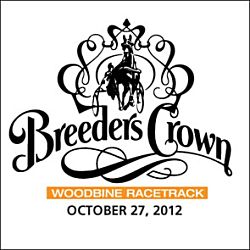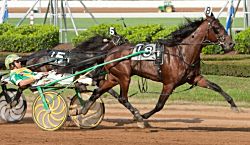Royalty For Life showcases Massachusetts breeding program
October 26, 2012,by Robert Lieberman, New England Chapter, USHWA
Norwood, MA — When Royalty For Life, bred by Al Ross of South Dartmouth, Mass., goes behind the starting gate Saturday night in the $600,000 Breeders Crown for freshman trotting colts, the New England horse will be representing, in one sense, all of the six-state region. In a broader sense, he will be validating the vision of the Massachusetts legislature.

A dozen years ago, at the dawn of a new century, the Massachusetts Sire Stakes program was moribund. Twice in a span of 11 years the track at Foxboro, which was the only racing venue in the state, had closed its doors. In both cases it was several years before racing resumed in the Commonwealth.
Stables that are structured around overnight horses can live three or four days at a time. No matter how inconvenient it might be, there is always a draw taking place somewhere. But breeders, the backbone of the harness racing industry, the element which literally pumps new blood into it on an annual basis and perpetuates its growth, must take a longer view. Those investors can’t live condition sheet to condition sheet.
In 2001, as part of an omnibus racing bill, the Standardbred breeders of the state and the state legislature revised the sire stakes program, focusing on mares rather than stallions. The new regulation allowed breeders access to any stallion, anywhere, with the caveat that the mare had to reside and foal in Massachusetts, thus offering that traditional support for the state’s agricultural industry.
This change allowed owners of mares an opportunity to breed to the highest quality stallions, if they chose to, and at least in theory increased the quality of the local breeding program’s product. In essence, what had been a sire stakes program became the futurity also, and the focus on mares allowed more people to participate, returning harness racing to its more democratic roots.
Within two years, a product of the restructured program, RC Royalty, made appearances in the Breeders Crown, as both a 2- and 3-year-old. Bred by Chip Campbell of Belchertown, Mass., the son of Credit Winner raced in the Massachusetts program, but is much better known for his appearances in events such as the Hambletonian and Breeders Crown.

Nigel Soult photo
Royalty For Life has won seven times as a freshman, with earnings of $184,633.
Now his son, Royalty For Life, repeats his father’s story, as a Massachusetts eligible going to post Saturday as one of the pre-race favorites in a nationally prominent race.
Might there be more Royalty For Life’s in the years to come? Perhaps. With expanded gaming on the horizon in Massachusetts, the breeding program in the state has caught the eye of at least a couple of other successful owners who are no strangers to the sport’s limelight.
During the past couple of breeding seasons the powerful Lindy Farms, owner of many notable horses like recent Hambletonian competitor Crazed, has sent mares to the Bay State. There have even been inklings that the farm, located just over the border in nearby Enfield, Conn., might eventually build a wing in a Massachusetts locale.
Bill Varney, who has demonstrated success in sire stakes programs in New York, Pennsylvania, Florida, Maine and Canada, has also sent mares to Massachusetts during the past two seasons, with an eye toward the future.
“It looked like an opportunity close to home,” said Varney, who hails from Bangor, Maine, noting that the monies he pays to farms, veterinarians and blacksmiths all contribute to the Bay State’s economy.
A little over a decade ago, the legislature was proactive, and the local sire stakes program has grown. Once again, however, the Massachusetts Standardbred breeders are at a crossroads. The expanded gaming seen on the horizon gets a bit closer every day. How much of that revenue will find its way to the breeding program is an open question. The answer to that question will decide if Royalty For Life — a Massachusetts eligible, racing in the sport’s premier event — is merely an exception, or if in the future, locally bred horses of that caliber in events such as the Breeders Crown might become the rule.
- Ducharme is enjoying his brush with ‘Royalty’ (Friday, October 12, 2012)
About six months after he hooked him up to the jog cart, George Ducharme realized Royalty For Life possessed some potential. The colt has enjoyed a banner freshman season with earnings of $178,338 from 12 trips to the post and a record of 7-1-1.
- Royalty For Life ready for his crowning; Pine Credit scratches from 2-year-old colt trot (Monday, October 22, 2012)
He’s called Royalty For Life. For trainer George Ducharme winning the Breeders Crown juvenile colt trot would be a life changing experience.
